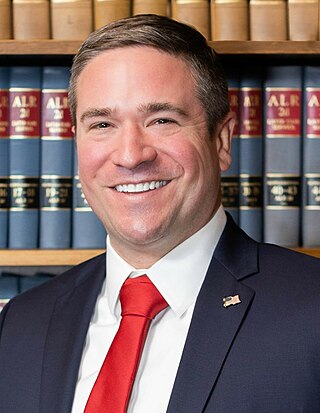In most common law jurisdictions, the attorney general or attorney-general is the main legal advisor to the government. In some jurisdictions, attorneys general also have executive responsibility for law enforcement, prosecutions or even responsibility for legal affairs generally. In practice, the extent to which the attorney general personally provides legal advice to the government varies between jurisdictions, and even between individual office-holders within the same jurisdiction, often depending on the level and nature of the office-holder's prior legal experience.
The Director of Public Prosecutions (DPP) is the office or official charged with the prosecution of criminal offences in several criminal jurisdictions around the world. The title is used mainly in jurisdictions that are or have been members of the Commonwealth of Nations.
In the United States, a special counsel is a lawyer appointed to investigate, and potentially prosecute, a particular case of suspected wrongdoing for which a conflict of interest exists for the usual prosecuting authority. Other jurisdictions have similar systems. For example, the investigation of an allegation against a sitting president or attorney general might be handled by a special prosecutor rather than by an ordinary prosecutor who would otherwise be in the position of investigating his or her own superior. Special prosecutors also have handled investigations into those connected to the government but not in a position of direct authority over the Justice Department's prosecutors, such as cabinet secretaries or election campaigns.

A prosecutor is a legal representative of the prosecution in states with either the adversarial system, which is adopted in common law, or inquisitorial system, which is adopted in civil law. The prosecution is the legal party responsible for presenting the case in a criminal trial against the defendant, an individual accused of breaking the law. Typically, the prosecutor represents the state or the government in the case brought against the accused person.

The New Hampshire Supreme Court is the supreme court of the U.S. state of New Hampshire and sole appellate court of the state. The Supreme Court is seated in the state capital, Concord. The Court is composed of a Chief Justice and four Associate Justices appointed by the Governor and Executive Council to serve during "good behavior" until retirement or the age of seventy. The senior member of the Court is able to specially assign lower-court judges, as well as retired justices, to fill vacancies on the Court.

The attorney general of Ireland is a constitutional officer who is the legal adviser to the Government and is therefore the chief law officer of the State. The attorney general is not a member of the Government but does participate in cabinet meetings when invited and attends government meetings. The current attorney general is Rossa Fanning, SC.

The attorney general of North Carolina is a statewide elected office in the U.S. state of North Carolina. The attorney general is a constitutional officer responsible for representing state agencies in legal matters, supplying other state officials and prosecutors with legal advice, and leading the North Carolina Department of Justice. The incumbent attorney general, Jeff Jackson, assumed office on January 1, 2025. The position of attorney general dates back to North Carolina's colonial history. North Carolina's 1776 constitution established the office as an official appointed by the North Carolina General Assembly. The state's 1868 constitution made the attorney general an elected executive official with their duties prescribed by law. Since 1971, the officer has sat on the North Carolina Council of State.
The New Hampshire Department of Justice (NHDOJ) is a government agency of the U.S. state of New Hampshire. The department is led by the Attorney General of New Hampshire, currently John Formella. NHDOJ headquarters are located at 1 Granite Place South in Concord.

The attorney general of New Mexico, an elected executive officer of the state, oversees the New Mexico Attorney General's Office and serves as head of the New Mexico Department of Justice.
The attorney general of New Hampshire is a constitutional officer of the U.S. state of New Hampshire who serves as head of the New Hampshire Department of Justice. As of April 22, 2021, the state's attorney general is John Formella.

The attorney general of Oklahoma is the State Attorney General for the state of Oklahoma. The attorney general serves as the chief legal and law enforcement officer of the State of Oklahoma and head of the Office of the Oklahoma Attorney General. The attorney general is responsible for providing legal advice to the other departments and agencies of the executive branch, legislative branch and judicial branch of the state government. The attorney general is also responsible for the prosecution of offenses against Oklahoma law and advocate for the basic legal rights of Oklahoma residents.

The government of the U.S. State of Oklahoma, established by the Oklahoma Constitution, is a republican democracy modeled after the federal government of the United States. The state government has three branches: the executive, legislative, and judicial. Through a system of separation of powers or "checks and balances," each of these branches has some authority to act on its own, some authority to regulate the other two branches, and has some of its own authority, in turn, regulated by the other branches.

The Florida attorney general is an elected cabinet official in the U.S. state of Florida. The attorney general serves as the chief legal officer of the state, and is head of the Florida Department of Legal Affairs.

The Texas attorney general is the chief legal officer of the U.S. state of Texas. The current officeholder, Republican Ken Paxton, has served in the position since January 5, 2015.

The Office of the Missouri Attorney General was created in 1806 when Missouri was part of the Louisiana Territory. Missouri's first Constitution in 1820 provided for an appointed attorney general, but since the 1865 Constitution, the Attorney General has been elected. As of January 2023, there have been 44 attorneys general in Missouri.
The Washington State Bar Association (WSBA) is the state bar association of the U.S. state of Washington. It operates under the delegated authority of the Washington Supreme Court to license the state's nearly 41,000 active and inactive lawyers and other legal professionals. The WSBA's mission is to serve the public and the members of the Bar, to ensure the integrity of the legal profession, and to champion justice.

Keating v. Edmondson, 2001 OK 110, 37 P.3d 882 (2001), was an Oklahoma Supreme Court case that ruled that the Governor of Oklahoma could not alter the structure of his Cabinet without the approval of the Legislature. The case was primarily concerned with the Governor–Legislature relation. The case is unique because the two parties in the case were both state-wide elected officials:

The Office of the Solicitor General of the Philippines, formerly known as the Bureau of Justice, is an independent and autonomous office attached to the Department of Justice. The OSG is headed by Menardo Guevarra.

The attorney general of Georgia is a statewide elected attorney and legal advisor for the executive branch of the U.S. state of Georgia. They are a constitutional officer responsible for providing opinions on legal questions concerning the state, prosecuting public corruption cases, overseeing contracts on behalf of the state, representing the state in all civil cases, in all capital felony appeals, in all cases appearing before the Supreme Court of the United States, and leading the Georgia Department of Law. They may also initiate civil or criminal actions on behalf of the State of Georgia when requested to do so by the governor.

The Office of the Attorney General (OAG) is an agency of the Oklahoma state government that is headed by the Attorney General of Oklahoma. The OAG is responsible for supervising the administration of justice across the State, providing legal assistance to the State government, and prosecuting violators of State law.























